Forensic Science Major Resources
Here you will find:
- Key information about your major
- How and when to meet with your major advisor
- Planning tools that will help you track your progress in the major
- Ways to explore career opportunities related to the Forensic Science major
Take a few moments to look at the information below. It will help you plan effectively and avoid surprises during your studies at John Jay. Please visit the Science Department's website for information, resources, and opportunities!
Forensic Science Requirements
Freshmen
To be admitted to the Forensic Science (FOS) major as a freshman, you must meet the following criteria:
Out-of-State Freshmen
High School academic average of 81 or higher AND
3 years of HS Math AND
3 years of HS Science AND
Have taken HS Chemistry course
In-State Freshmen
High School academic average of 81 or higher AND
3.5 units of HS Math AND
4 units of HS Science AND
Have taken HS Chemistry Regents OR HS Chemistry course
1. If you meet the above criteria and select Forensic Science as your desired major on your admissions application, you will be approved for the FOS major. Your first chemistry and biology courses at John Jay will be determined by your math placement.
2. If you do not meet the above criteria, you will be defaulted to a Criminal Justice BS (CJBS) major, which you could change to another non-science major if you wish. If you still have a strong interest in the FOS major, you can try to achieve admission to the major by doing the following:
- Register for a Life and Physical Science course in your first semester at John Jay (SCI 114, in-person lecture rather than on-line, is the preferred choice, or SCI 110/112/166).
- Register for your math placement course (MAT 105/141/151).
- Earn at least a 2.5 GPA in your math and science courses.
- At the end of the term, after your grades have been posted, consult with the Science Department for your follow-up biology and chemistry courses, or possibly consider a biology or chemistry minor.
3. If you did not apply for the FOS major but are interested in declaring it, at your freshman registration session you must express this interest. An academic advisor will give you a Referral Form to take to the Admissions Office, where they will evaluate your eligibility. If admitted, you will be allowed to register for the appropriate biology and chemistry courses. If not, see STEP 2 above for students who do not currently meet the major's admission criteria.
Continuing Students
If you would like to switch to FOS from another major, consult with Dr. Sandra Swenson (sswenson@jjay.cuny.edu) or major coordinator Dr. Jenifer Rosati (jrosati@jjay.cuny.edu) to discuss the feasibility of this switch and learn what you can do to put yourself in the strongest position for admission.
Transfer Students
In order to gain admission to FOS as a transfer student, you must have completed core science courses such as biology, chemistry, physics, algebra, or calculus at another college with a GPA of 2.5 or higher in these courses. If you don’t meet these admissions criteria, you will be defaulted to the Criminal Justice BS (CJBS) major (see STEP 2 above for pathway into the major). If you have some math and science, then reach out to Dr. Sandra Swenson (sswenson@jjay.cuny.edu) or major coordinator Dr. Jennifer Rosati (jrosati@jjay.cuny.edu) to discuss your options.
You are responsible for the major requirements that were in effect when you declared the major. To confirm the requirements you should be following, go to the Undergraduate Bulletin for that academic year. For example, if you declared the Forensic Science major in Fall 2015 or Spring 2016, you would click on the 2015-2016 Undergraduate Bulletin. If you declared the major and then left the College for more than one full semester, you’re responsible for the major requirements in effect when you return, if they have changed.
Below, find the Undergraduate Bulletin that was in effect when you declared the major.
- 2024-2025 Undergraduate Bulletin - FOS
- 2023-2024 Undergraduate Bulletin - FOS
- 2022-2023 Undergraduate Bulletin - FOS
- 2021-2022 Undergraduate Bulletin - FOS
- 2020-2021 Undergraduate Bulletin - FOS
- 2019-2020 Undergraduate Bulletin - FOS
- 2018-2019 Undergraduate Bulletin - FOS
- 2017-2018 Undergraduate Bulletin - FOS
- 2016-2017 Undergraduate Bulletin - FOS
- 2015-2016 Undergraduate Bulletin - FOS
- 2014-2015 Undergraduate Bulletin - FOS
- 2013-2014 Undergraduate Bulletin - FOS (PDF)
- 2012-2013 Undergraduate Bulletin - FOS (PDF)
| Below is a list of FOS courses that can also meet your general education requirements. Note that a single science course cannot meet both the Life and Physical Science requirement and the Scientific World requirement. You must meet these requirements with two separate courses. | ||
| Math & Quantitative Reasoning | Life & Physical Science | Scientific World |
| MAT 151 | BIO 102 | BIO 102 |
| MAT 152 | BIO 103 | BIO 103 |
| MAT 301 | BIO 104 | BIO 104 |
| CHE 102 | CHE 102 | |
| CHE 103 | CHE 103 | |
| CHE 104 | CHE 104 | |
| CHE 201 | CHE 201 | |
| CHE 202 | CHE 202 | |
| PHY 203 | PHY 203 | |
| PHY 204 | PHY 204 | |
| CHE 220 |
Major Advising
FOS major advising is being done remotely in Fall 2025. To schedule an appointment, make an appointment via Navigate with either Professor Jennifer Rosati (https://jjay-cuny.campus.eab.com/pal/_lF-jAPttN) or Professor Sandra Swenson (https://jjay-cuny.campus.eab.com/pal/gJytZaC2kb). You can arrange an email or Zoom meeting with one of them.
Major Advisors
Coordinator
Professor Jennifer Rosati, Department of Sciences
212-393-6868
Advisor
Professor Sandra Swenson, Department of Sciences
212.237.8820
Professor Monica Mattesi, Department of Sciences
Chair
Professor Jennifer Rosati
Contact via Navigate: https://jjay-cuny.campus.eab.com/pal/_lF-jAPttN
646.557.4637
Science Internship (FOS 401) Coordinator
Professor Linda Rourke for forensic science laboratory internships
646.557.4637
Undergraduate Research Internship (FOS 402) Coordinator
Please read the FOS 402 guidelines and email fos402@jjay.cuny.edu if you have any further questions.
During Summer session (June 2 - August 25) 2025 there will be several FOS faculty advisors available for FOS major advising.
Until July 1, Professor Shu-Yuan Cheng (shcheng@jjay.cuny.edu) will be available for FOS major advising. Her Navigate link is:
https://jjay-cuny.campus.eab.com/pal/EZBNrFuyH0
Professor Jennifer Rosati (jrosati@jjay.cuny.edu) will be available for FOS major advising throughout the summer. Her Navigate link is:
https://jjay-cuny.campus.eab.com/pal/_lF-jAPttN
Professor Sandra Swenson (sswenson@jjay.cuny.edu) will be available for FOS major advising starting July 17 to the beginning of Fall classes. Her Navigate link is:
https://jjay-cuny.campus.eab.com/pal/gJytZaC2kb
Sophomores with 45-59 credits may have a hold on their registration. The hold will be removed when they have a major advising appointment with Dr. Sandra Swenson (212.237.8820, sswenson@jjay.cuny.edu). This discussion will encourage wise planning and allow students to ask any questions they may have about the major. How do you know if you have a major hold? Go to CUNYfirst and complete the following steps:
- Check the Holds box of your CUNYfirst Student Center. If "Advisement Required" appears, click on “details.”
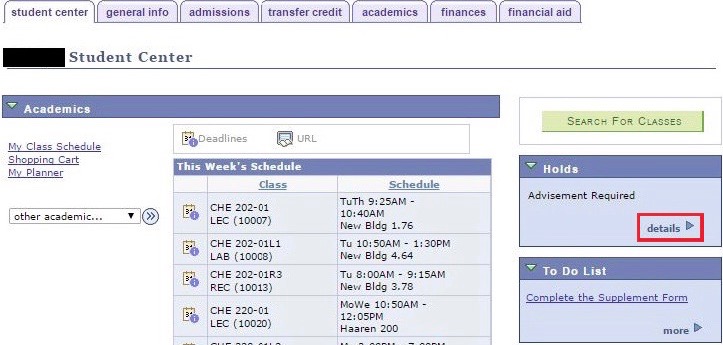
- Click on “Advisement Required.”

- See which type of advisement you need. If you must see a major advisor, then make a major advising appointment following the steps preferred by this department.
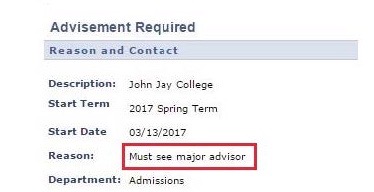
Plan Ahead: Graduate on Time
The Forensic Science major has several courses that build on each other in a sequence, so it is important to be aware of this and plan accordingly.
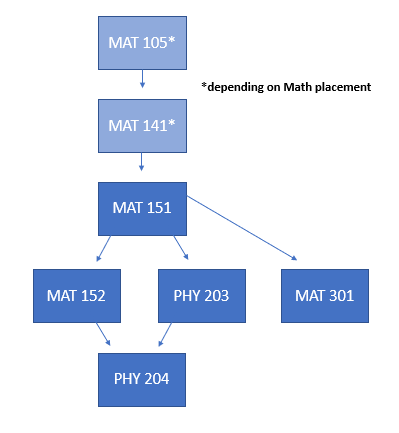
Math
You are required to take two semesters of calculus (MAT 151 and MAT 152) and one semester of probability and statistics (MAT 301). If you place into MAT 105, you will need that course and then MAT 141 as foundation for the MAT 151-152 calculus sequence, so it is important to take these math courses as early as possible.
Other important considerations:
- MAT 105 or higher is a prerequisite or co-requisite for certain Biology and Chemistry courses.
- MAT 151 is a prerequisite for PHY 203. MAT 152 and PHY 203 are both prerequisites for PHY 204. You are expected to take Physics in your sophomore year.
- If you start with MAT 105 in a Fall semester, then take MAT 141 in spring, you can take MAT 151 during summer session to be ready for Physics in the upcoming fall.
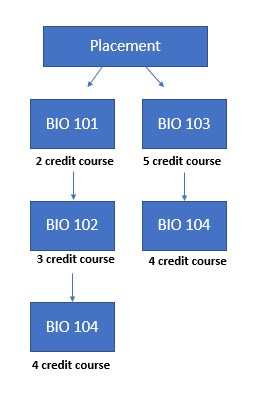
Biology
Your placement will be either BIO 101 or BIO 103.
- If you start with BIO 103 (a 5 credit lab science course), you will then take BIO 104.
- If you start with BIO 101 (a 2 credit course), you will then take BIO 102 (3 credits) before taking BIO 104.
The Biology sequence should be completed by the end of freshman year or fall of sophomore year.
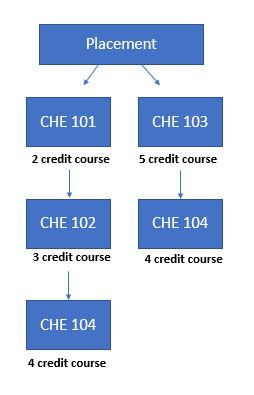
Chemistry
Your placement will be either CHE 101 or CHE 103.
- If you start with CHE 103 (a 5 credit lab science course), you will then take CHE 104.
- If you start with CHE 101 (a 2 credit course), you will then take CHE 102 (3 credits) before taking CHE 104.
Be sure to complete the Chemistry sequence by the end of your freshman year (spring or summer) to prepare for the Organic Chemistry sequence in your sophomore year.
An internship is required for the forensic science degree. You may fulfill this requirement with either FOS 401 or FOS 402. The internship is to be completed after the junior year in the Forensic Science major progression. To learn more about your internship options, please contact one of the Science Internship Directors below:
Professor Linda Rourke for forensic science laboratory internships
646.557.4501
Please read the FOS 402 guidelines and contact Dr. Edgardo Sanabria-Valentín if there are any further questions
esanabriavalentin@jjay.cuny.edu
212.393.6489
- DegreeWorks degree audit - Use this online planning tool to track your overall progress toward graduation. You will see which of your general education and major requirements are completed, in progress, or still needed. Refer to the Degree Works FAQs to better understand how to use this helpful tool. Note: be sure to confirm the accuracy of your degree audit with a general advisor and major advisor.
- Forensic Science Advisement Form - Fill out this printable worksheet to keep track of which major requirements you have completed and which ones you still need.
- Sample Four Year Plan - See our Sample Four Year Plan for students who placed into MAT 105 or our Sample Four Year Plan for students who placed into MAT 141 for an example of how you could complete all your degree requirements (major, general education, electives) and graduate in four years! Remember that each plan shows just one possible way to combine your requirements. Transfer students in particular should work with advisors to determine what works best for them.
A General Academic Advisor will confirm what general academic requirements you still need, make suggestions about smart course planning that will help you graduate without delays, discuss your interest in adding a minor or second major, inform you about opportunities such as study abroad, discuss general questions and concerns, and make helpful referrals. Visit the Academic Advisement Center's webpage for more information.
Forensic Science and Careers
The Master of Forensic Science degree program at John Jay College of Criminal Justice-CUNY is designed to provide training and expertise to individuals planning to become scientists, administrators, laboratory directors, educators, and professionals in a variety of forensic science sub-specialties. More information is available on the Master of Forensic Science webpage.
Listen to Professor Jennifer Rosati talk about what the Forensic Science major is and how it prepares you through research and internships for both graduate school and the professional world.
Resources
Learn about FOS-related careers on the American Academy of Forensic Sciences website.
John Jay’s Career Learning Lab is another great resource for questions related to job searches, internships, and career preparation. CLL staff are available to meet individually with students and alumni in L72.00 New Building. You can schedule an appointment or attend their walk-ins.
Background Checks
Because forensic science is part of the criminal justice system, personal honesty, integrity, and scientific objectivity are paramount. Those seeking careers in this field should be aware that background checks similar to those required for law enforcement officers are likely to be a condition of employment. The following may be conducted and/or reviewed before an employment offer is made and may remain as ongoing conditions of employment (This list is not all-inclusive):
- Drug tests
- History of drug use
- Criminal history
- Personal associations
- Polygraph examination
- Driving record
- Past work performance
- Credit history
- Medical or physical examination